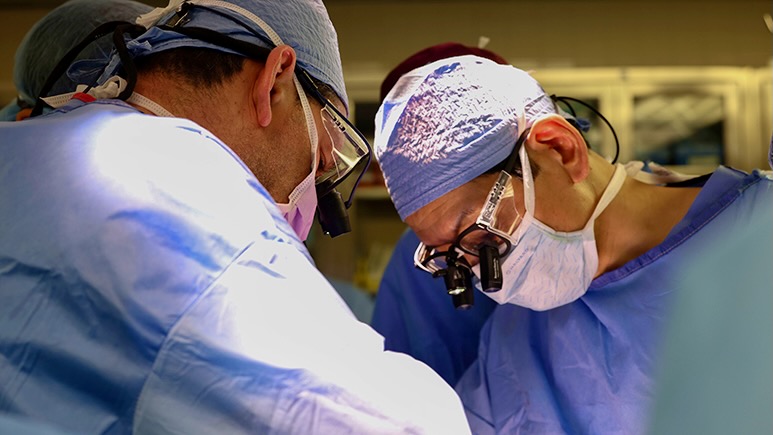1000’s of individuals a yr die whereas ready for an organ transplant. Early experiments in xenotransplantation are elevating hopes this might quickly be a factor of the previous.
Within the US, 100,000 individuals are presently on the organ transplant ready record, and 17 of them die day-after-day earlier than receiving an organ. The persistent scarcity of organ donors has lengthy led medical doctors to flirt with the thought of xenotransplantation, a process the place tissue or an organ from an animal is transplanted right into a human.
Early experiments have been largely unsuccessful and ethically questionable, although, and the thought remained firmly on the fringes of the medical world. That’s largely as a result of excessive danger of rejection. It is a downside for human transplants too, nevertheless it’s rather more dangerous when utilizing organs from different species.
However the introduction of more and more highly effective and exact genetic engineering applied sciences resembling CRISPR have ushered the thought from the shadows. The flexibility to make edits to the donor animals’ DNA to stop the manufacturing of biomolecules identified to induce immune responses in people has raised hopes the strategy could also be viable in any case.
Lately, a handful of pioneering experiments in people have demonstrated that genetically engineered pig organs can a minimum of briefly operate easily within the human physique. Medical problems, organ rejections, and affected person deaths have meant none of those procedures have offered a long-term answer, however the outcomes to this point have been promising.
“At Massachusetts Normal Hospital alone, there are over 1,400 sufferers on the ready record for a kidney transplant,” Leonardo Riella, who led the surgical workforce at Mass Normal that transplanted a pig kidney right into a affected person, stated in a press launch earlier this yr.
“A few of these sufferers will sadly die or get too sick to be transplanted as a result of lengthy ready time on dialysis. I’m firmly satisfied that xenotransplantation represents a promising answer to the organ scarcity disaster.”
In 2021, within the first human experiment involving a genetically engineered pig organ, medical doctors transplanted a kidney right into a affected person who was already mind useless. The workforce knocked out a gene for a molecule referred to as alpha-gal—which causes organ rejection—within the donor pig. The surgical procedure seemed to be successful: The kidney produced urine and confirmed no indicators of rejection, however the affected person was solely stored alive for 54 hours.
The next yr, a affected person with terminal coronary heart failure obtained a genetically modified pig coronary heart and initially appeared to do properly, however then handed away 60 days later. Whereas it’s not solely clear why he died, the medical doctors discovered that pre-screening did not flag a pathogen referred to as porcine cytomegalovirus that was present in his coronary heart afterwards, which might have contributed. He’d additionally been given an antibody therapy that had reacted with the guts.
Then earlier this yr, two kidney illness sufferers who have been ineligible for regular transplants obtained gene-edited pig kidneys from donor pigs bred by biotech agency eGenesis. Utilizing CRISPR, the corporate made 69 edits that eliminated some pig genes, added some human ones, and diminished the danger of latent virus within the organ reactivating and harming the affected person.
The procedures appeared to go properly. Medical doctors even discharged the primary affected person after figuring out the kidney was functioning properly, and he now not wanted dialysis. Two months later he handed away, however he had different underlying well being points, and the hospital stated there was no indication his loss of life was the results of the transplant.
The second affected person needed to have the kidney eliminated after 47 days on account of “distinctive challenges” stemming from the very fact she had additionally had a mechanical coronary heart pump implanted simply earlier than the transplantation. There have been no indicators of rejection, however the kidney began dropping operate as a result of her coronary heart was not capable of pump blood with sufficient stress, the researchers stated.
The latest experiment was introduced in Might, when Chinese language researchers stated that they had transplanted a liver from a genetically modified pig right into a 71-year-old man with liver most cancers. Whereas particulars of the process are restricted, the workforce claimed the person was “doing very properly” greater than two weeks after surgical procedure.
Whereas most of those experiments have been short-lived, the truth that solely two instances noticed the transplanted organ fail—certainly one of which was on account of exterior problems—is a promising signal. For moral causes, medical doctors have solely been capable of experiment with sufferers whose possibilities of survival have been already slim.
But it surely does imply that we now have little thought whether or not xenotransplantation could possibly be a viable long-term answer for sufferers. There may be additionally some concern that implanting organs from different animals into people might make it simpler for pathogens to leap between species, doubtlessly creating the danger of recent pandemics.
Different researchers are investigating whether or not, as an alternative of transplanting pig organs into people, we might develop human organs in pigs. Final September, researchers introduced they’d transplanted human stem cells into pig embryos the place they then grew into rudimentary kidneys.
This strategy is a good distance from human trials although, so in the interim, xenotransplantation looks as if a extra promising solution to deliver down transplant wait instances. Whereas it’s nonetheless early days, the promising early outcomes counsel we is probably not removed from a future the place substitute organs might be grown to order.
Picture Credit score: Massachusetts Normal Hospital


